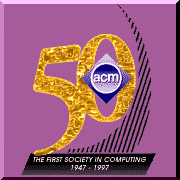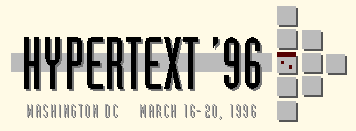



We have 14 half-day and two full-day courses:
6 meet on Saturday, and 11 meet on Sunday.
| Course Title | Day | Time | Instructor(s) | Course # |
|---|---|---|---|---|
| Educational Uses of Hypermedia | Sat | AM/PM | Landow&Russell | #16 |
| Serving Hypermedia to the Web (Hyper-G) | Sat | AM/PM | Andrews | #2 |
| Moving from Print to Interactive Media | Sat | AM | Cain | #6 |
| HTML 3.0, Style sheets, & VRML | Sat | PM | Raggett | #1 |
| Electronic Commerce on the WWW | Sat | PM | Isakowitz | #7 |
| Java for the WWW | Sun | AM | Chan | #5 |
| Large Scale Info Mgmt (Microcosm) | Sun | AM | Hall&Davis | #3 |
| New Interactive Media Publications | Sun | AM | Ritchie | #8 |
| Sustainable Hypermedia Publications | Sun | AM | Glushko | #9 |
| O-O Hypermedia Sys Design (Dexter) | Sun | AM | Gronbak&Trigg | #11 |
| Reading & Evaluation of Hypermedia Apps | Sun | AM | Paolini | #12 |
| Design of Collaborative Environments | Sun | AM | Streitz | #13 |
| Netscape WWW site & 2.0 extensions | Sun | PM | Bergson | #4 |
| The HyTime Standard | Sun | PM | Kimber | #14 |
| Hypermedia Engineering Hands-on | Sun | PM | Nanard | #15 |
1) Course: Designing Web pages with HTML3, style sheets, and VRML
This course will review the features of Hypertext Markup
Language (HTML) version 3.0, the proposed standard for style sheets
developed by the World Wide Web Consortium. The instructor will also review
the Virtual Reality Modeling Language (VRML) being developed for presenting
3D objects on the World-Wide Web.
Instructor: Dave Raggett, World Wide Web Consortium
Date: Saturday afternoon, half day
2) Course: Serving Hypermedia to the Web with Hyper-G
Hyper-G is a second generation information system, which
provides advanced facilities for the structuring and maintenance of large
amounts of information, and which can be accessed by World-Wide Web,
Gopher, and native Hyper-G clients. This course will give participants an
understanding of the concepts behind Hyper-G and the in-depth knowledge
necessary to set up and run a Hyper-G information server.
Instructor: Keith Andrews, Institute for Information Processing and
Computer Supported New Media, Graz University of Technology, Austria
Date: Saturday, full day
3) Course: Large Scale Hypermedia Information Management
The aim of this course is to examine the problems associated
with large scale multimedia information delivery and management using
hypermedia systems. Link management is crucial to maintaining control of
large scale hypermedia projects. The course will consider various methods,
including use of structured documents and separate databases of links. The
course will examine currently available systems including The World Wide
Web and Hyper-G as well as the Microcosm system which was developed by the
Multimedia Group at the University of Southampton specifically for managing
large scale hypermedia resources. Case studies will be used throughout to
illustrate the principles covered by the course.
Instructors: Wendy Hall and Hugh Davis, The University of Southampton UK
Date: Sunday morning, half day
4) Course: The Netscape WWW site and Netscape 2.0 extensions
The Netscape web site is one of the most heavily trafficked
sites on the Internet. The instructor, who is editor of this site, will
review how the site was created and then focus on strategies for using the
many new HTML extensions supported by Netscape Navigator 2.0 on websites
today.
Instructor: Eliot Bergson, Netscape Corporation
Date: Sunday afternoon, half day
5) Course: Java for the WWW
The Java programming language promises to add new levels of
interactivity to the World-Wide Web. This course will review the design and
development of the Java language and discuss examples of how it can be used
in a variety of web applications.
Instructor: Patrick Chan, formerly with Sun Microsystems
Date: Sunday morning, half day
6) Course: Moving from Print to Interactive Media
This course will explore design principles of interactive
media and the computer-human interface. The goal is to give attendees a
look at the world of both interactive media and multimedia from the
perspective of the design field, and to briefly step through a process for
creating interactive media applications. We will cover a simplified process
and a short list of questions intended to help translate content in one
media form (paper) to interactive media.
Instructor: John Cain, E Labs
Date: Saturday morning, half day
7) Course: Electronic Commerce on the WWW
This tutorial presents an introduction to key aspects of
electronic commerce from a technical and business strategy. The purpose of
this tutorial is to explain the principles that govern hypermedia on the
WWW, elaborate on the Hypermedia/Internet connection, and provide an
understanding of key policy and management issues involved in electronic
commerce
Instructors: Tomas Isakowitz and Ajit Kambil, Stern School of Business,
New York University
Date: Saturday afternoon, half day
8) Course: New Interactive Media Publications
In the competitive struggle over how to build new mass markets
for consumer interactive publications, the war may not yet be over, but the
battles are all running in one direction, and the winner is usually
hypertext, in the shape of the World-Wide Web delivered over the Internet.
As a publishing medium WWW is almost perfect: low cost; mass free;
instantaneous; global. However, at the moment, nobody is making any real
money in consumer publishing. We still don't know how to build the business
models, what mixture of subscription, advertising and sponsorship will be
sustainable? What impact will the low cost of entry have on 'professional'
publishing. These are the issues that will be addressed in this course.
Instructor: Ian Ritchie, British Computer Society, UK
Date: Sunday morning, half day
9) Course: Sustainable Hypermedia Publications
A hypertext publishing effort becomes sustainable when a
business and organizational framework is put in place to support it. At
that point: an end-to-end publishing process is defined and documented, and
people have clear job responsibilities within it; publications can be
maintained on a schedule and new ones added by people other than those who
worked on the initial effort; technology choices are not fixed, and
hardware or software can be upgraded transparently publication quality and
the cost to achieve it are measurable and predictable. This course is about
ensuring that your hypertext publishing efforts are sustainable, or making
a conscious choice when you don't want them to be.
Instructor: Robert J. Glushko, Passage Systems
Date: Sunday morning, half day
10) Cancelled
11) Course: Object-oriented hypermedia system design --
a Dexter-based Approach
This course will use the Dexter Hypertext Reference Model as a
basis for addressing current problems in hypermedia system design.
Particular topics will include: components as vehicles for integrating
third-party applications, virtual components to support dynamically
computed content, structured composites as models of the inner contents of
linked objects, extensions to Dexter's notion of link directionality,
dangers and benefits of dangling links, and use and maintenance of anchors
with and without link markers. The tutorial will also present a Dexter
based architecture for hypermedia in collaborative settings. The discussion
will draw on examples from applications built in the DEVISE Hypermedia
(DHM) framework, developed at Aarhus University, Denmark.
Instructors: Kaj Gronbaek, Aarhus University, and Randy Trigg, Xerox PARC
Date: Sunday morning, half day
12) Course: Selected Reading & Evaluation of Hypermedia Applications
This course will introduce methods and criteria to critically
read and systematically analyze, test and evaluate hypermedia applications,
coupling a hypermedia design model (HDM) and general usability criteria. We
will present and discuss a variety of hypermedia applications, including CD
ROMs, research prototypes, and WWW applications, from a wide range of
domains including education and training, museums, entertainment,
catalogues, encyclopedias and multimedia databases. Attendees should be
able to look more rationally and critically at existing applications,
detecting inconsistencies and suggesting potential improvements, and
discuss more precisely requirements and design choices.
Instructor: Paolo Paolini, Politecnico di Milano, Italy
Date: Sunday morning, half day
13) Course: Designing Collaboration Environments based on
the Common Ground of Hypermedia and CSCW
The objective of this course is to help participants 1) to
learn about the widely neglected but existing common ground of hypermedia
and CSCW, 2) to gain a better understanding of the opportunities of
cooperative hypermedia systems by learning about the two roles of
hypermedia, i.e. to be the subject matter of and a medium for cooperative
work, 3) to evaluate the potential of hypermedia systems for building
collaboration-support environments, 4) to develop a personal judgment by
being presented with examples of existing systems comparing their
underlying design rationale and resulting system features. At the end,
participants will be able to understand when and how to consider
hypermedia-based information systems for collaboration support in their own
work environment or in their product line.
Instructor: Norbert A. Streitz, Integrated Publication and Information
Systems Institute, German National Research Center for Information
Technology
Date: Sunday afternoon, half day
14) Course: An Introduction to the HyTime Standard
This course introduces students to the HyTime standard,
ISO/IEC 10744, providing a conceptual overview of the standard and how it
can be applied in general to the problems of creating, managing, and
presenting hypermedia information. The course covers the following topics:
using SGML and HyTime to represent hypermedia documents; hyperlinking and
addressing in HyTime; Data storage abstractions in SGML and HyTime;
defining hypermedia presentations with HyTime (event schedules and finite
coordinate spaces); using HyTime with current tools and technology; using
HyTime for networked delivery of hypermedia.
Instructor: W. Eliot Kimber, Passage Systems
Date: Sunday afternoon, half day
15) Course: Hypermedia Engineering Hands-on
This course aims at demonstrating in practice the simplicity
and the efficiency of the mixing of automatic generation with incremental
design on a real scale problem. After an introduction to the design method,
attendees will directly participate in a "hands on" session, putting into
practice the method and designing an hypermedia document about the HT'96
conference. The method will follow the main stages of refinement loop, from
design to automated production and then to the evaluation and maintenance
of a real scale hyperdocument. The "hands on" session will focus on design
issues such as the iterative improvement of the navigation structure, the
look and interaction, taking advantage of the evaluation of the produced
hypermedia document.
Instructor: Marc Nanard, Laboratoire D'Informatique de Robotique et de
Microelectronique de Montpellier, France
Date: Sunday afternoon, half day
16) Course: Educational Uses of Hypermedia: From Design to the Classroom
Hypermedia, a powerful tool for creating and delivering
educational materials, combines many forms of media into a rich
representational system creating possibilities for dramatically expanded
educational opportunities. In this course we will examine the
state-of-the-art in educational hypermedia, exploring not only what's
currently available, but also what is will be coming in the near-term
future. Examples of currently available hypermedia will be examined, and
heuristics for selecting, using, and creating educational hypermedia will
be given. The instructor's experiences in using hypermedia in education
will highlight the difficulties and opportunities hypermedia presents.
Instructors: Dan Russell, Apple Computer, George P. Landow, Brown University
Date: Saturday, full day